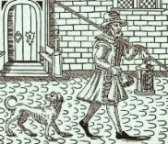Macbeth Glossary
It was the owl that shriek'd, the fatal bellman (2.2.5-6)
 In Renaissance England the hoot of an owl flying over one's house was an evil omen, and meant impending death for someone inside. Shakespeare refers to the owl as the "fatal bellman" because it was the bellman's job to ring the parish bell when a person in the town was near death. "This was called the "passing bell," and was a signal for all hearers to pray for the dying person. After the death, there would be one short peal [chime]; from its sound the hearers could tell whether the deceased was male or female" (Singman, Jeffrey. Daily Life in Elizabethan England. Westport. Greenwood Press. 1995. p.53). In the play, of course, the owl "shriek'd" for King Duncan.
In Renaissance England the hoot of an owl flying over one's house was an evil omen, and meant impending death for someone inside. Shakespeare refers to the owl as the "fatal bellman" because it was the bellman's job to ring the parish bell when a person in the town was near death. "This was called the "passing bell," and was a signal for all hearers to pray for the dying person. After the death, there would be one short peal [chime]; from its sound the hearers could tell whether the deceased was male or female" (Singman, Jeffrey. Daily Life in Elizabethan England. Westport. Greenwood Press. 1995. p.53). In the play, of course, the owl "shriek'd" for King Duncan.
I am reminded of the famous line by Shakespeare's contemporary, John Donne, who wrote: "never send to know for whom the bells tolls; it tolls for thee." (Devotions upon Emergent Occasions, 1624.)
Back to Macbeth (2.2)
______
Related Articles
 Macbeth: The Annotated Play Macbeth: The Annotated Play
 Macbeth Character Introduction Macbeth Character Introduction
 Soliloquy Analysis: If it were done when 'tis done (1.7.1-29) Soliloquy Analysis: If it were done when 'tis done (1.7.1-29)
 Soliloquy Analysis: Is this a dagger (2.1.33-61) Soliloquy Analysis: Is this a dagger (2.1.33-61)
 Soliloquy Analysis: To be thus is nothing (3.1.47-71) Soliloquy Analysis: To be thus is nothing (3.1.47-71)
 Soliloquy Analysis: She should have died hereafter (5.5.17-28) Soliloquy Analysis: She should have died hereafter (5.5.17-28)
 Explanatory Notes for Lady Macbeth's Soliloquy (1.5) Explanatory Notes for Lady Macbeth's Soliloquy (1.5)
 Explanatory Notes for the Witches' Chants (4.1) Explanatory Notes for the Witches' Chants (4.1)
 Macbeth Plot Summary (Acts 1 and 2) Macbeth Plot Summary (Acts 1 and 2)
 Macbeth Plot Summary (Acts 3, 4 and 5) Macbeth Plot Summary (Acts 3, 4 and 5)
 The Curse of Macbeth The Curse of Macbeth
 Shakespeare's Sources for Macbeth Shakespeare's Sources for Macbeth
 Macbeth Q & A Macbeth Q & A
 Macbeth Study Quiz (with detailed answers) Macbeth Study Quiz (with detailed answers)
 Quotations from Macbeth (Full) Quotations from Macbeth (Full)
 Top 10 Quotations from Macbeth Top 10 Quotations from Macbeth
 Metaphors in Macbeth (Biblical) Metaphors in Macbeth (Biblical)
 Shakespeare's Writing Style Shakespeare's Writing Style
 Shakespeare's Language Shakespeare's Language
 Shakespeare's Metaphors and Similes Shakespeare's Metaphors and Similes
 Shakespeare's Reputation in Elizabethan England Shakespeare's Reputation in Elizabethan England
 Shakespeare's Impact on Other Writers Shakespeare's Impact on Other Writers
 Why Study Shakespeare? Why Study Shakespeare?
 Quotations About William Shakespeare Quotations About William Shakespeare
 Shakespeare's Boss Shakespeare's Boss
________
How to cite this article:
Mabillard, Amanda. Macbeth Glossary. Shakespeare Online. 20 Aug. 2000. (date when you accessed the information) < http://www.shakespeare-online.com/plays
/macbeth/macbethglossary/macbeth1_1/macbethglos_owlshriek.html >.
|  In Renaissance England the hoot of an owl flying over one's house was an evil omen, and meant impending death for someone inside. Shakespeare refers to the owl as the "fatal bellman" because it was the bellman's job to ring the parish bell when a person in the town was near death. "This was called the "passing bell," and was a signal for all hearers to pray for the dying person. After the death, there would be one short peal [chime]; from its sound the hearers could tell whether the deceased was male or female" (Singman, Jeffrey. Daily Life in Elizabethan England. Westport. Greenwood Press. 1995. p.53). In the play, of course, the owl "shriek'd" for King Duncan.
In Renaissance England the hoot of an owl flying over one's house was an evil omen, and meant impending death for someone inside. Shakespeare refers to the owl as the "fatal bellman" because it was the bellman's job to ring the parish bell when a person in the town was near death. "This was called the "passing bell," and was a signal for all hearers to pray for the dying person. After the death, there would be one short peal [chime]; from its sound the hearers could tell whether the deceased was male or female" (Singman, Jeffrey. Daily Life in Elizabethan England. Westport. Greenwood Press. 1995. p.53). In the play, of course, the owl "shriek'd" for King Duncan.